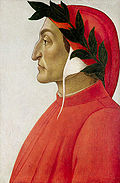- Contrapasso
-
Contrapasso (or, in modern italian,[1] contrappasso) refers to the punishment of souls in Dante's Inferno, "by a process either resembling or contrasting with the sin itself."[2] A similar process, though a penitential one, occurs in the Purgatorio.[2]
One of many examples of contrapasso occurs in the 4th Bolgia (Inferno, Canto XX), where the sorcerers, astrologers, and false prophets have their heads twisted around on their bodies backward, so that they "found it necessary to walk backward, / because they could not see ahead of them."[3] While referring primarily to attempts to see into the future by forbidden means, this also symbolises the twisted nature of magic in general.[4] Such a contrapasso "functions not merely as a form of divine revenge, but rather as the fulfilment of a destiny freely chosen by each soul during his or her life."[5]
The word contrapasso can be found in Canto XXVIII of the Inferno, in which the decapitated Bertran de Born declares: "Così s'osserva in me lo contrapasso" (XXVIII, 142)[6] which Longfellow translates: "Thus is observed in me the counterpoise"[7] De Born is in the 9th Bolgia of schismatics, for (Dante believes) causing the rebellion of Henry the Young King against his father, Henry II of England.[8] He is decapitated there as a contrapasso for his (supposed) act of political decapitation in undermining a rightful head of state.[8]
Dante inherited the idea and the name of contrapasso from theological (Thomas Aquinas's Summa Theologica) and literary (Medieval "visions", such as Visio Pauli, Visio Alberici, and Visio Tungdali) sources.[1]
Notes
- ^ a b Enciclopedia Dantesca, Biblioteca Treccani, 2005, vol. 7, article Contrapasso.
- ^ a b Mark Musa, commentary notes in The Divine Comedy. Volume 1: Inferno. Penguin Classics: 1984, pp. 37-38.
- ^ Inferno, Canto XX, lines 14–15, Mandelbaum translation.
- ^ Dorothy L. Sayers, Hell, notes on Canto XX.
- ^ Peter Brand and Lino Pertile, The Cambridge History of Italian Literature, 2nd ed, Cambridge University Press, 1999, ISBN 0521666228, pp. 63-64.
- ^ http://etcweb.princeton.edu/dante/pdp/
- ^ http://www.everypoet.com/Archive/poetry/dante/dante_contents.htm
- ^ a b Mark Musa, commentary notes in The Divine Comedy. Volume 1: Inferno. Indiana University Press, 1996, ISBN 025332968X, p. 380.
Dante Alighieri Works in Latin 
Works in Italian Divina Commedia Characters of
Divina CommediaAlichino · Barbariccia · Ciampolo · Cocytus · Corso Donati · Dis · Eunoe · Forese Donati · Malacoda · Malebranche · Malebolge · Piccarda · Satan · ScarmiglioneInsights Contrapasso · Cultural references in Divina CommediaIn popular culture Dante and his Divine Comedy in popular culture · Après une Lecture de Dante: Fantasia quasi Sonata · Dante crater · Dante Park · The Divine Comedy (symphony) · Dante's Inferno (1924 film) · Dante's Inferno (1935 film) · Dante's Inferno (2007 film) · Dante's Inferno (video game) · Dante's Inferno: An Animated Epic · Dante Symphony · Demon Lord Dante · L'Inferno (film) · Italian battleship Dante AlighieriCategories:- The Divine Comedy (Dante)
Wikimedia Foundation. 2010.

